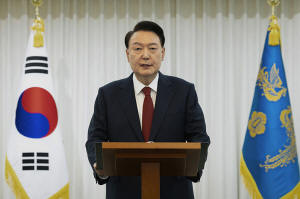South Korean investigators seek to question reluctant president over
martial law
 Send a link to a friend
Send a link to a friend
 [December 20, 2024]
By KIM TONG-HYUNG [December 20, 2024]
By KIM TONG-HYUNG
SEOUL, South Korea (AP) — South Korean investigators on Friday again
sought to question impeached President Yoon Suk Yeol over his Dec. 3
declaration of martial law, summoning him for questioning on Christmas
Day despite his repeated refusal to cooperate.
The Corruption Investigation Office for High-Ranking Officials, which is
leading a joint investigation with police and military authorities into
the ill-conceived power grab that lasted only a few hours, said it plans
to question Yoon on charges of abuse of authority and orchestrating a
rebellion.
Yoon, whose presidential powers have been suspended since the
opposition-controlled National Assembly impeached him on Dec. 14, has so
far dodged three separate requests by the joint investigation team and
public prosecutors to appear for questioning while also blocking
searches of his office.
It’s not clear what investigators can do if Yoon continues to reject
their demands. Under the country’s laws, locations potentially linked to
military secrets cannot be seized or searched without the consent of the
person in charge, and it’s unlikely that Yoon will voluntarily leave his
residence if he faces of being compelled to appear.
Yoon is focusing on defending himself at the Constitutional Court, which
following his impeachment will decide whether to remove him from office
or reinstate his powers.
Yoon’s martial law decree and parliamentary impeachment have triggered a
political storm, disrupting state affairs, halting high-level diplomacy
and sending shockwaves through financial markets at a time when the
country was already grappling with a faltering economy.
The country’s acting leader, Prime Minister Han Duck-soo, and other
officials have tried to reassure allies and diplomatic partners that
things are returning to normal, but tensions between rival political
parties are only escalating as they clash over government policies and
the appointments of new justices to the Constitutional Court, which has
three vacant spots.

Authorities have already arrested Yoon’s defense minister, police chief
and several other military commanders involved in the attempt to enforce
the martial law decree, which harkened back to the days of authoritarian
leaders the country hasn’t seen since the 1980s.
Yoon and his military leadership have been accused of attempting to
block parliament from voting to end martial law by sending hundreds of
heavily armed troops to encircle the National Assembly. Lawmakers who
managed to get in unanimously voted 190-0 to lift martial law. Yoon says
the troops were there to maintain order.
Kwak Jong-keun, the now arrested commander of the Army Special Warfare
Command, testified in parliament that Yoon had asked for his troops to
“quickly destroy the door and drag out the lawmakers who are inside” the
Assembly’s main chamber where the vote occurred. Kwak said he did not
carry out Yoon’s orders.
[to top of second column]
|

In this photo released by South Korean President Office via
Yonhap, South Korean President Yoon Suk Yeol speaks at the
presidential residence in Seoul, South Korea, on Dec. 14, 2024.
(South Korean Presidential Office/Yonhap via AP, File)

Yoon has also been accused of ordering defense intelligence
officials to detain key politicians, including opposition leader Lee
Jae-myung, National Assembly speaker Woo Won Shik and the ex-leader
of his own conservative party, Han Dong-hun, according to a
high-ranking intelligence official and Han himself, a reformist who
supported investigations into corruption allegations against first
lady Kim Keon Hee.
The joint investigation team also on Friday obtained a court warrant
to formally arrest Maj. Gen. Moon Sang-ho, commander of the Defense
Intelligence Command, who was detained this week over suspicions
that he sent troops to the National Election Commission in Gwacheon
city after Yoon declared martial law.
Yoon defended his decision for troops to be deployed at the election
commission as other forces were encircling the National Assembly. He
claimed the troop deployment was necessary in order to investigate
supposed vulnerabilities to the commission’s computer systems
potentially affecting credibility of election results.
Yoon's failure to offer any evidence in support of his claims raised
concerns that he was endorsing conspiracy theories from right-wing
YouTube channels that April's parliamentary elections were rigged.
The Democratic Party had won those elections by a landslide. The
election commission rejected Yoon’s allegations, stating there was
no basis to suspect election fraud.
Moon, the military intelligence chief, is also suspected of
discussing operational plans for enforcing martial law with two
subordinates and retired former defense intelligence commander Noh
Sang-won at a fast-food restaurant, just two days before Yoon
declared martial law.
Seok Dong-hyeon, a lawyer and spokesperson for Yoon’s legal team,
defended the president’s actions on Thursday. He echoed Yoon’s
assertion that he didn’t commit rebellion but saw martial law as an
emergency measure to counter the main opposition Democratic Party,
which used its parliamentary majority to obstruct his agenda.
Seok insisted that Yoon had no intentions to paralyze the
parliament’s functions, despite the troop deployment to the National
Assembly, and claimed he never ordered politicians to be detained.
When asked whether Yoon would continue to ignore authorities’
requests to question him and search his office, Seok declined to
give a specific answer, saying that these matters would be handled
by Yoon’s legal team, which he said has been nearly assembled.
Some experts say any attempt to compel Yoon to appear for
questioning would ultimately require consent of the country’s acting
leader, Prime Minister Han Duck-soo, who is locked in a standoff
with the opposition Democratic Party after he vetoed several
controversial agricultural bills backed by the party.
All contents © copyright 2024 Associated Press. All rights reserved |